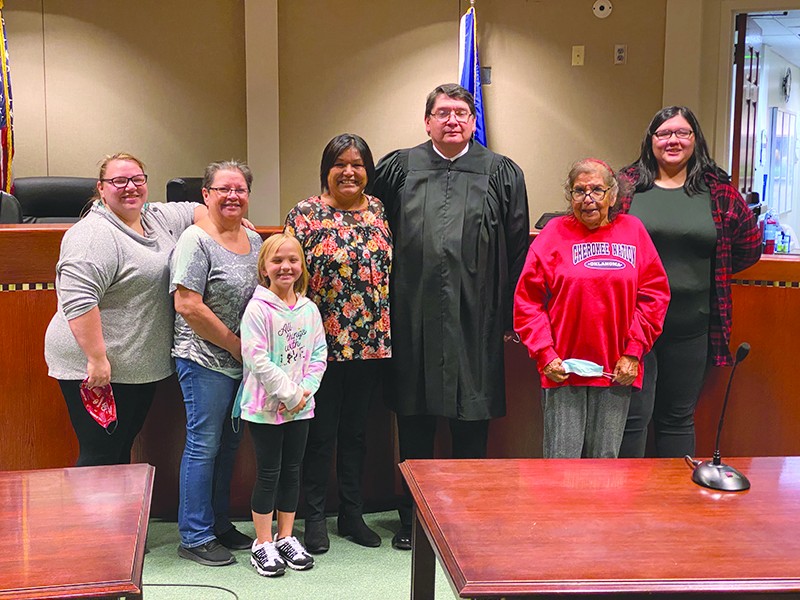
Judge Richard Osburn stepped into the challenging role of District Court Judge for the Mille Lacs Band’s Tribal Court this fall, but with a prior six-year term under his belt, it is a challenge he is familiar with and well prepared to meet.
Judge Osburn wants Band members to know that if they come to Tribal Court, they are going to receive a fair hearing. "My job is to be neutral, to look at the facts alleged, apply the law, and make an impartial decision," he said.
Judge Osburn places a high priority on timely resolution of cases. He recently heard of a child welfare case in State Court that took 90 days for a motion to transfer to be granted. "My goal is to get orders out the day of the hearing or the next business day. Seven days is the longest you will wait here. If you have a hearing, and the facts are clear and the law is clear, you should get a decision in a timely fashion and not have to wait four, five, or six weeks."
When Judge Osburn served his first term with the Band, there was a big backlog of cases, which he and his Tribal Court colleagues cleared up in a couple of months. This time, they’ve already dealt with the backlog. "We’re caught up now, and the goal is to stay caught up," he said.
In addition to timely resolution of cases, Tribal Court is far less expensive for Band members in most cases. "State court is going to cost you a lot more money and take a lot more time," said Judge Osburn. "In Tribal Court, we can get somebody’s situation resolved a lot quicker with minimal costs, and sometimes zero out-of-pocket expenses."
The majority of cases heard in Tribal Court are child welfare cases, along with guardianships, adoptions, and custody. Judge Osburn can also perform weddings.
Violations of the Band’s criminal code (Title 24, Chapter 2) are also heard in Tribal Court.
Shortly after the COVID-19 pandemic began, Chief Justice Court Orders 53, 54, and 55 were issued to establish procedures so that hearings, trials, filings, and affidavits would not need to occur in person.
Judge Osburn is currently working from home three days a week while coming in for courtroom hearings on Tuesdays and Thursdays.
Band members can rest assured that Judge Osburn is well qualified for the position of District Court Judge. He graduated from law school at the University of Oklahoma, and in addition to his previous work for the Band and the Cherokee Nation, he has spent the last six years as an unemployment judge with the State of Minnesota. He has also earned three professional development certifications — one of the first judges in the nation to complete three trainings with the National Judicial College.
He is also an Appeals Officer for the Courts of Indian Offenses, which, according to the Bureau of Indian Affairs, "operate where tribes retain jurisdiction over American Indians that is exclusive of state jurisdiction, but where tribal courts have not been established to fully exercise that jurisdiction."
He also served in the military, enlisting in the Air Force Reserve in high school and then transferring to Naval ROTC in college. His military career gave him the opportunity to visit Thailand, Australia, Saudi Arabia, and Bahrain as he served active duty on two destroyers as an Ensign, followed by eight years in the Reserves. "Being in the Reserves was a lot more fun than active duty," he said.
Judge Osburn got his first job out of law school thanks to his mother, who knew the General Counsel for the Cherokee Nation. She introduced the two, and Richard had a job waiting for him as soon as he passed the bar. "Sometimes success is being in the right place at the right time," he said.
Judge Osburn served as District Court Judge from 2008 to 2014. He had come to work for the Band as Deputy Solicitor in 2007 and was nominated by the Chief Executive and confirmed by the Band Assembly.
Judge Osburn is married to Kristie Vance, who works as a full-time substitute teacher at Nay Ah Shing High School. He has three adult children and one who is a student at Onamia High School.
The Judicial Branch is the smallest of the Tribal Government’s three branches. There are nine employees in the branch, which is overseen by three Appeals Court Justices and Court Administrator Gilda Burr.
According to Judge Osburn, judicial employees prefer to remain under the radar while doing their jobs. "Our goal is to stay in the basement and not make it into the newspaper," he joked.
Judge Osburn replaces Judge David Christensen, who did not seek another term.
JUDICIAL BRANCH
The judicial branch of the Mille Lacs Band of Ojibwe preserves and maintains justice and accords equal rights, equal protection, and equal opportunity for Band members under Band laws and statutes. The Band’s Court of Central Jurisdiction is made up of a District (or trial) Court and a Court of Appeals.
The Appeals Court consists of an Associate Justice from each of the reservation’s three districts, one of these being the Chief Justice. The Appeals Court handles any appeals from the District Court, which is presided over by the District Court Judge. The District Court hears all civil cases, including traffic and natural resource violations, small claims, family cases, juvenile justice cases, and more. All justices are appointed by the Band’s Chief Executive and ratified by the Band Assembly to serve six-year terms.
The Interim Chief Justice is Ramona Applegate, who represents District II, and the District I Associate Justice is Elmer Nayquonabe. The District III Associate Justice position is currently vacant.